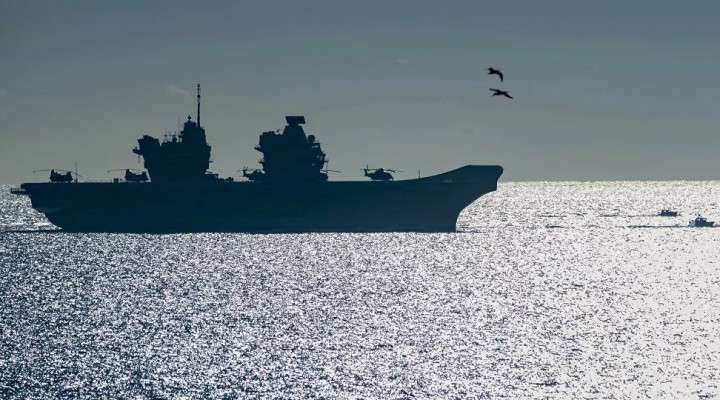Why Britain Aggresses Russia

Why is Britain spending billions of dollars on two new super aircraft carriers? That’s the question the state-owned BBC asks. However, don’t expect the British Bullsh**t Corporation to provide any insightful answers.
The two ships in question – now coming into service – are HMS Queen Elizabeth and HMS Prince of Wales, lovingly named after the British monarchy. The total cost for building these “leviathans” is around £6 billion ($8bn), according to the BBC. But when fully fitted out with new warplanes, the cost will soar to multiples of that figure.
At a time when poverty is hitting record levels in Britain and the country is facing an economic meltdown over its Brexit divorce from the European Union, it is certainly pertinent to question the seemingly twisted priorities of British state planners in putting these mega warships into service.
You have to appreciate the scale of these vessels. HMS Queen Elizabeth is 280 meters in length, longer that the iconic Houses of Parliament building in London. It can host up to 60 aircraft on its deck.
The BBC calls the two new super carriers “gunboat diplomacy on steroids”. They are bigger than any other previous British-made aircraft carrier, all which have been decommissioned through old age.
The US navy currently has 10 such vessels. China, France and Russia have one each. With two aircraft carriers, Britain is thus showing “global ambitions”. But what are those ambitions?
Significantly, both of these British warships are reportedly designed to be compatible with US counterparts. Britain has ordered 48 American-made Lockheed Martin F-35B stealth fighter jets, specifically for deployment on its new carriers. It is planning to buy a total of 138 F-35s to complete the battle group.
Each F-35 warplane has a price tag of around $100 million. So, for the total package of 138 planes for the two carriers, the final cost could be near $18 billion. That’s on top of the $8bn building budget.
Again, this is a bewildering extravagance with British taxpayers’ money at a time when the country is suffering from massive poverty and its public health services – once the envy of the world – are in abject deterioration.
The design of Britain’s new carriers – in particular the compatibility with US navy and air force – is perhaps the key to what British “global ambitions” are really about.
Britain is positioning itself as a hired gun for American imperialism in the 21st century. Think about it. Why would Britain build these giant warships to be of such service to US warplanes, instead of British-European counterparts like the EuroTyphoon fighter?
The function of Britain as a military accomplice of the US is nothing new of course. All during the Cold War decades, British forces were a reliable partner in American overseas interventions. The henchman role played by Britain was euphemistically called the “special relationship”.
After the Cold War, the “special relationship” continued with Britain joining in American wars on Afghanistan and Iraq. The British not only provided important firepower and boots on the ground to terrorize occupied populations on behalf of the Americans, the accomplice role also provided an important veneer of “multilateralism” and, therefore, legal cover for what was otherwise blatant criminal aggression.
Looking ahead, Washington’s imperial planners are fixated on the return of “great power rivalry”. China and Russia are explicitly fingered as the targets. As American economic power diminishes, the role of its military is assigned more purpose to offset this weakness with regard to exerting US global power.
But American military power is also limited by historic economic demise. With a national debt of $22 trillion – and counting – the outlook for US militarism is one of inevitable constraints.This is where Washington’s partner in militarism – Britain – is finding a new assignment. Namely, to share the military burden of “securing” the globe in the 21st century for Anglo-American capitalism.
Britain’s two new super carriers fit this arrangement. Admittedly, construction of the vessels was initiated 10 years ago. But we are talking about strategic planning here, and how American and British planners anticipate trends of geopolitics.
What is of concern is how British political and military leaders, as well as state propaganda outlets (like the BBC and think-tanks like the Integrity Initiative), have been zealously ramping up Russophobia in recent years.
The alleged poisoning of former spy Sergei Skripal in England last year is a case in point. The British political and media establishment have been banging war drums over that dubious incident with accusations that the Russian government ordered “an assassination on the streets of Britain” – an “act of war” no less, it is claimed.
Britain’s warmongering against Russia is also demonstrated by its increased “interception” of Russian warplanes and warships in international waters; its unprecedented deployment of troops to the Arctic and Baltic (including Prince Harry!) – “to send a signal to Moscow”; and recently the dispatch of a British warship to the Black Sea to support the Neo-Nazi regime in Kiev which, British defense minister Gavin Williamson claims, is “facing Russian aggression”.
British delusions of grandeur as a former imperial power are pathetic. But these delusions are also dangerous when Britain is being given a new role as America’s imperialist henchman for the 21st century. And in a bid to try to prove its “worth”, Britain is becoming more belligerent towards Russia.
https://sputniknews.com/columnists/201901081071310653-why-uk-aggresses/
 TheAltWorld
TheAltWorld 
0 thoughts on “Why Britain Aggresses Russia”